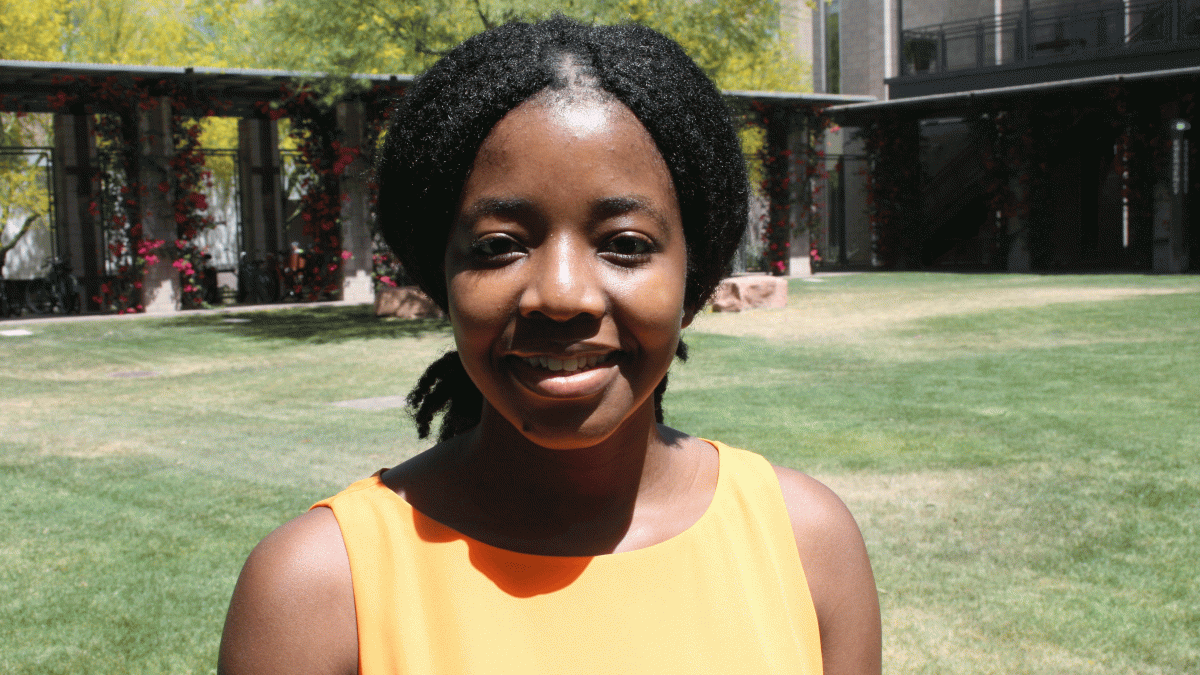Editor's note: This story is being highlighted in ASU Now's year in review. Read more top stories from 2018 here.
Charity Bhebhe had about a 1.5 percent probability of winning one of the world’s most prestigious scholarships.
It was enough.
This month, the Arizona State University senior from Zimbabwe found out she beat out thousands of other applicants from around the world to earn a Gates Cambridge Scholarship.
One of 92 scholars, the molecular biology and biotechnology major in the School of Life Sciences — also a Mastercard Foundation Scholar — will pursue a doctoral degree in pharmacology at Cambridge University in the United Kingdom.
“I am very excited, and I am proud of myself,” Bhebhe said. “I am also very thankful to everyone who helped me with the application — especially my advisers, professors and my mentor and (principal investigator) Dr. Heather Bean for all the guidance and support. I wouldn’t have done it without their help.”
While at Cambridge, scholars pursue the full range of subjects available and are spread through its departments and colleges. Up to 95 scholars are selected each year, including 40 from the U.S. and 55 from other countries. Of this year’s almost 5,800 applicants, 423 were shortlisted by their departments and, of these, 201 were interviewed in the U.S. and Cambridge by four panels of interviewers drawn from across Cambridge University.
“Winning a Gates Cambridge Scholarship is a remarkable achievement, and my office and the Barrett leadership could not be prouder of Charity,” said Kyle Mox, associate dean of Barrett, The Honors College at ASU and director of the Lorraine W. Frank Office of National Scholarships Advisement.
“She is among a cohort of only 92 stellar students from around the entire world chosen to receive this honor, which illustrates not only her remarkable academic and intellectual potential, but her long-term leadership potential,” Mox said. “She’s somebody that is going to make a real difference in the future.”
The lack of basic resources to treat minor illnesses in Zimbabwe spurred Bhebhe to study the molecular mechanisms of diseases with the goal of successfully preventing them.
“It has always been my goal to be able to apply my medical research skills in investigating and preventing diseases to improve health care standards and give people from disadvantaged communities like my own a fair chance to fight against disease,” she said. “I intend to use my training in pharmacology to continue researching molecular and cellular systems involved in disease progression and, consequently, develop therapies for human disease.”
ASU and Barrett were a huge help in winning the honor, Bhebhe said. She heard about the opportunity from the Barrett Office of National Scholarship Advisement.
Mox talked her through the process and provided pointers for the application.
“I received a lot of help and guidance from my professors and advisers as well on the writing portion of the application and the preparing for the interviews,” she said.
Charity is the third Gates Cambridge Scholar from ASU in the past four years. In the 2016 competition year, ASU alum Michael Meaney was selected, and in the 2015 competition year, Blake Thomson was honored. Other recent ASU winners include Nicole Person-Rennell in 2011 and Ben Strauber in 2010.
“This high level of commitment — to research, leadership, and service — is a fundamental quality of the Barrett community, and we try to encourage our students to see how they can leverage their talents against the opportunities that they receive at ASU to go out into the world and tackle the big problems,” Mox said. “It isn’t always apparent to our students, when they’re walking back and forth to meals or study sessions, that they live and study at a global campus. When our students win these sorts of awards, I hope they say, 'Yes, I can do that, too.'”
The Gates Cambridge Scholarship program was established in October 2000 by a donation of $210 million from the Bill and Melinda Gates Foundation to the University of Cambridge. Scholarships are awarded to outstanding applicants from countries outside the U.K. to pursue a full-time postgraduate degree in any subject available at the University of Cambridge. Scholars are selected on the basis of their outstanding intellectual ability, leadership potential and commitment to improving the lives of others.
Top photo: Charity Bhebhe will head across the pond to study on the Gates Cambridge Scholarship. Photo by Nicole Greason
More Science and technology

ASU-led space telescope is ready to fly
The Star Planet Activity Research CubeSat, or SPARCS, a small space telescope that will monitor the flares and sunspot activity of low-mass stars, has now passed its pre-shipment review by NASA.…

ASU at the heart of the state's revitalized microelectronics industry
A stronger local economy, more reliable technology, and a future where our computers and devices do the impossible: that’s the transformation ASU is driving through its microelectronics research…

Breakthrough copper alloy achieves unprecedented high-temperature performance
A team of researchers from Arizona State University, the U.S. Army Research Laboratory, Lehigh University and Louisiana State University has developed a groundbreaking high-temperature copper alloy…


